#it was difficult and I died like 120 times
Explore tagged Tumblr posts
Text






#the evil within#juli kidman#sebastian castellanos#I love the art direction in this game#the controls in the first one were a mess#it was difficult and I died like 120 times#I did a lot better in this one#died 5 times#aaand someone brought his paralysis demon#I have enough of that in real life
9 notes
·
View notes
Text

Paring: Dom!Minho X Sub!Male!Reader
Genre: Smut / 18+ MDNI
Summary: As a 17-year-old runaway, your husband Minho has always been there for you, but how he wants the favor returned is far more explicit.
Note: Dead Dove: Dont Eat
My Pookies: @dis-trict9:3 @lezleeferguson-120
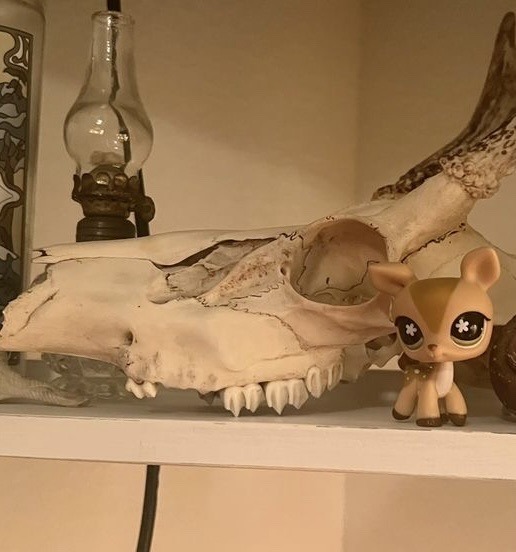


Warnings: Fingering, Unprotected Sex, Ass Fucking, Tw: Blood/Mentions of Abuse, Swear Words, Age Gap, Oral Sex, Face Fucking, Choking/Suffocation, Use of Numbing Lube, Pet Names, Cock Dumb Reader, Asshole Minho
When people see the two of you in public they think nothing of it. A cute couple living their best life with a sweet and endearing husband on one side and a husband who'll do anything for his partner on the other. Inseparable from the start is the only way to describe the relationship.
When you dropped out of high school everything in your life became difficult. No support came from your family whatsoever and they told you you'd never amount to anything. Running away from your family seems cliche but it was your only option and you decided to never look back. Living on the streets and doing odd jobs was your life until you met him. He was like a light that you never knew needed to be turned on and he helped you. He took you into his house on that rainy cold night and showed you what real care looked like. Some may say it's weird and improper but in your mind, you're old enough to make the right decisions and he was definitely right.
You were only 17 when he first took you into his house but now it was a year later and you both were happily married.
Living with him made your life so much easier in so many ways. Your family doesn't care to see you anymore so living with a 32-year-old man wasn't an issue. His name was Minho and he adored you. You wouldn't have to worry about school or a job cause he took care of the money, the only thing you had to do was indulge in any sexual act he demanded.
The hand he held out to you when you slipped in the street was the same hand he smacked you with when in the bedroom. He was always rough, making you hurt in ways you never imagined you could and tonight was no different.
You knew it was coming, all the subtle hints he threw at you couldn't be ignored. Like when he spit in your mouth before letting you eat the dinner he prepared.
~
You sat comfortably on the couch reading one of your favorite books, trying your best to ignore him. He was in the corner chair watching your every move, much like a lion waiting for the right time to pounce. His moves were always unpredictable and you could never say if he was going to be forgiving or plain out harsh.
You finally finished the chapter you’d been reading all afternoon when you heard his footsteps. You flipped the page and pretended you were still reading but it was useless.
“Hand,” he said in a deep tone. You reached your hand out placing it in his and he jerked you to stand up. The snap of his belt in his hand scared you and you became aware of the situation very quickly.
You placed your hands together comfortably and watched as he tightened the belt with his teeth around your wrists. He was so hot doing it that you didn't even notice how tight the belt was getting. Leaving no room for you to move and soon your hands would lose all blood flow.
Grabbing the end of his belt he dragged you into your shared bedroom and bent you over the bed. Judging by Minho’s quick movements and lack of words tonight was going to be rough.
He stripped you down till your ass was exposed and hanging over the bed. Two fingers slipped into your tight hole and you couldn't help moaning at the intrusion. His long body fingers slipped in so easily, you clenched around him earning the first smack of the night.
The sting only lasted a second with his fingers pumping in and out of you, now rougher than before. You knew he was playing with you now purely for his amusement of watching you squirm under his touch.
He placed his hand on the back of your neck and pushed you down into the bed making it difficult to breathe. His stabbing nails scrapped the side of your walls and you could feel the stretches. He didn't care if you were in pain, only cared for his own pleasure of watching his fingers turn red when he finger fucked you harder.
He only took his fingers out when you let your body go loose, surrendering your butthole completely for him to see inside you. He hooked a finger in and slowly stroked your innards before pulling it out with a flick.
The next thing you heard was the zipper on his pants and the hamper opening. He was rough and mean most of the time, but never dirty.
He rubbed the red spot on your ass and smacked it again, before rubbing it gently. His smooth hand with wetness still lingering on it glided easily across your abused skin and gave you comfort.
Precum was already leaking out of the head of his penis telling you he was planning to fuck you for a while just didn't make a move.
He lined his penis up with your ass and pushed in hard, balls slapping against your skin as he let out a guttural moan. Both hands rested on your small hips as he started to fuck you.
His movements were rough and fast giving you no time to think. You tried lifting yourself up to see but all you glanced at was the big veins that ran down his cock pulsating and you were pushed back down.
“Stay down and hold fucking still. Your ass feels so good Baby.”
You whimpered and let your face be burried into the bed with each smack from his pelvis, showing him you'd be submissive as always and not move anymore.
It took Minho longer than you to orgasm but his always lasted longer. With his large penis rubbing all the right spots inside you and the subtle heaving you heard from behind that you caused.
You didn't even notice you were orgasming until your cum spilled out into a puddle on the bed. You thought you had more time to edge yourself but let go too quickly.
“Fuck now fill me,” you moaned on accident. You could hear the sharp breath from Minho and he was clearly pissed.
Next thing you knew, his fingers were stuffed down your throat far enough to make you gag, and tears formed in the corners of your eyes. His other hand dug into your stomach and held you back on his cock so you couldn't move.
He fucked up into you like a rabbit with the only sounds being your muffled cries and his moans. You'd already orgasmed once and he was nearer than a moment ago but the sensitivity was getting to you. He was fucking you so rough and you had no time to process anything like usual. His cock felt so good you just hung there and let your mind go blank, feeling everything but not understanding how to process it.
You hadn't moved throughout the entire ordeal that a small string of spit hung out of your mouth. You looked and felt gross but you loved it. Him fucking you so hard that you became lifeless on his cock with your cums running down your legs and sticking to the blankets.
~
As he pushed his hot semen up in your tight asshole, his thrusts became softer, and soon he wasn't moving at all. He probably didn't even realize he wasn't moving judging by his face. His eyes shut and mouth open trying to catch his breath.
You thought he was done, but instead of coming to your rescue and cleaning you up with such care. Whilst calling you his love and occasionally cuddling you. He instead, walked around to his side of the bed and pulled out the numbing lube. Putting only a small drop in his hand and rubbing it up his shaft with a wince.
He then returned to you, flipping you over and climbing completely on top of you till your head was straddled between his thighs.
“Open,” he instructed with a few small taps to your cheek. You listened, opening your mouth and letting his penis curve down into your throat. He had already gagged you with his fingers so you were a bit more prepared for his half-hard length.
The salty taste of his cum mixed with the odd flavor of the lube, then it was gone. Your mouth had gone completely numb from the friction of his rough movements all the way down your throat and the numbing agent. His penis slipped down your throat with no interruptions of you gagging and the look of approval was plastered on Minho’s face.
The sensitivity was clear, even with the numbing lube his cock was done and he wasn't gonna orgasm anymore.
Once he figured you'd had enough he stopped bouncing on your face and he took his penis out. He stared down at you with loving eyes and whispered a soft “I love you,”.
He squeezed you one last time with his thighs before getting off you and laying down beside you, wiping your abused lips with his sleeve.
“You've done good baby,” he said with a hum. He walked into the bathroom and ran a warm bath for you with what smelled like your favorite lavender bubble bath.
He returned to you with a smile and sat down beside you patting his lap. You laid your head down on his exposed leg and felt the warmth from his skin on your face.
“You should go get a hot bath. You'll feel better” he said softly.
Your body was so exhausted and worn out for obvious reasons, you couldn't help but fall asleep to the feeling of his big hands playing with your hair. He chuckled to himself as he watched your eyes flutter shut and your body go limp.
“I guess we're staying like this for a while then.”
#stray kids#skz#i love y’all💜#my pookies#fandom#kpop#staywriter#smut#my pookie#gay kpop#dom x sub#sub male reader#skz x male reader#stray kids x male reader#minho x male reader#lee know x male reader#skz smut#stray kids smut#lee know smut#agegap#age kink#dead dove fic#dead dove do not eat#18+ mdni#skz x reader#stray kids fandom#stray kids everywhere all around the world#kpop smut#kpop au#skz au
62 notes
·
View notes
Text
hi I am testing out whether or not I'm shadowbanned. however I don't want to spam the main tags w irrelevant posts so I am offering this snippet from art of the bedchamber part 2 \o/
tw soggy sfw danheng (pre-1.2)

Dan Heng remembers when he assumed his human form for the first time.
It is a difficult scene to forget: the wreckage of an IPC ship, engulfed in the red glow of emergency lights. A robotic voice signalling the steady loss of air: Attention, attention, the system had blared in a pleasant, sunny tone. Attention to all passengers. The Altair has experienced irreparable damage to its seal. There are 120 minutes until complete oxygen depletion. Please make your way to the lifepods. The Vega is on standby to receive all survivors. Attention, attention.
The PA system said nothing of the vengeful ghost who’d wrought all that destruction—both upon the ship and its passengers. Probably everyone who could have made such an announcement was dead.
Yinyue Jun, the wraith had called him, mara-poisoned eyes shining as his gaze fell upon his features. The same features that Dan Heng was now studying in the broken mirror, fragmented by cracks running through the glass. Dan Feng. Sinner. You’ll never escape your karmic debt. You'll never escape your punishment. I’ll find you whenever you are, no matter how far you run. Even if I forget everything else of my mortal life, I'll never forget your face.
His face.
Dan Heng had never seen much of his own face in the darkness of the Shackling Prison, but he'd been strung up and whipped for its likeness. Punished for whom it once belonged. This is simply the weight of your karma from your past life. It was you who buried your beloved. It was you who nearly destroyed your homeworld. It was your fault, Dan Feng, that she died. How could you do that to her? To your friend? High Elder, do you know how the Vidyadhara suffered for your pride? It is you who is at fault for the deaths of so many of our kin. You, you, you. This is what you deserve, Yinyue Jun, for your arrogance. it matters not if it was your past life, it matters not if you're now a child, you have no right to shed those tears—
Seeing his face—Yinyue Jun's face—for the first time then, with its gleaming irises, its jadeite horns, its otherworldly glow—
—Dan Heng hated it.
His features were a curse, one not unlike the powers he'd inherited. You should never be allowed to roam free, Dan Feng. You cannot be trusted with the powers of a High Elder. Not with how you lost control in your last life.
You are a danger to us all, Dan Feng.
This is what you deserve.
Dan Heng was eager to sculpt a new face for himself. Relieved to lock away his powers. Anxious to paint into existence a dream he’d long imagined as a child. The dull green of his eyes, the short clip of his dark hair, the only hint to his past a cinnabar stroke along his lashline—these were features he’d long envisioned for himself growing up in the Prison, devouring countless novels about worldly life on the Luofu. All those stories about human men and women, leading quaint and romantic lives unfettered by destiny. All those tales about mortals far removed from his existence as a disgraced High Elder.
Looking like this—plain, unassuming, without the marks of a Vidyadhara elder—Dan Heng could pretend to be one of those mortals. He could act like he'd never felt the bite of shackles in his wrists. Like he'd never felt the burn of a welt slashed across his back. Like he'd grown up in sunlight, not the darkness of a cell.
He could act as if he were in control of his own destiny.
It would be impossible, of course, to truly entertain these delusions. But he still likes to imagine it every now and then—particularly with you, nowadays. He thinks of it when he stares at your reflections in the mirror in the early morning, brushing your teeth side by side. He thinks of it when sees the photos that March 7th has taken of the two of you, pinned up conspicuously on your bedroom walls. He especially thinks of it when he catches himself looking at the selfies that you always insist on taking with him—which is very often, given how you like to snatch his phone and update his lockscreen with them.
To the uninformed eye, all of these scenes make the two of you look like a simple, human couple—one right out of a novel.
Dan Heng thinks about this most often: a normal life with you, in which he is not burdened with the title of Yinyue Jun. In which there is no chance of staining your future with the transgressions of his past. In which you’ve never once been hurt because of his relation to Dan Feng, and where you will never be hurt again.
If paradise is but a dream, he thinks, gazing at the contours of your soft expression, then I wish to sleep forever.

dividers by @/cafekitsune!
#its largely unedited i hope thats ok#dan heng x reader#hsr x reader#x reader#yueshuo.fics#hope thsi shows up
413 notes
·
View notes
Text
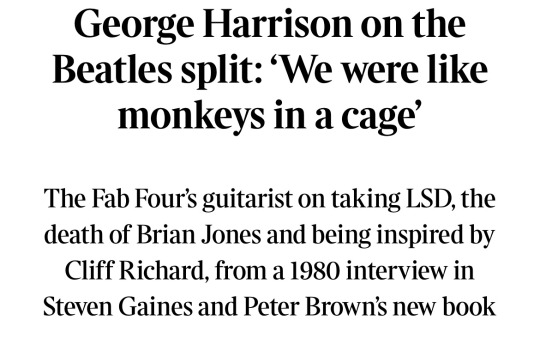
George Harrison remained an enigma to many people, even those who were close to him. For a man who lectured passionately about karma and the meaning of existence, he seemed self-protective and closed off. Witty when called upon, there were also moments when he could be quite boorish. Perhaps it was because he was only twenty years old when the Beatles became a global sensation. That might not seem particularly young in today’s world of social media fame, but at the time, it was uncharted territory for the kind of adulation he was experiencing.
It was also difficult living in the shadow of Paul and John. In the beginning, they were openly dismissive of him. Paul said he always thought of George as a little brother. At first, John pretended not to know his name and sardonically referred to him as “that kid’’. Ironically, one of George’s compositions, Something, became the most covered song in the Beatles catalogue.
This interview was conducted at George Harrison’s palatial home, Friar Park, in Henley-on-Thames, on November 5, 1980. George was gracious but cool. He made a pot of tea in the drafty, vast kitchen of his 120-room estate, and spent two hours lecturing about Transcendental Meditation and the details of a limited edition of his autobiography, I Me Mine, which is certainly how he must have felt getting out on his own.
In 2000, George was diagnosed with oropharyngeal cancer. George died on November 29, 2001, in the company of his wife, Olivia; his son, Dhani; musician Ravi Shankar; and Hare Krishna devotees who chanted verses from the Bhagavad Gita. He was 58 years old and left nearly $100 million in his will. George told Olivia that he didn’t want to be remembered for being a Beatle, he wanted to be remembered for being a good gardener.
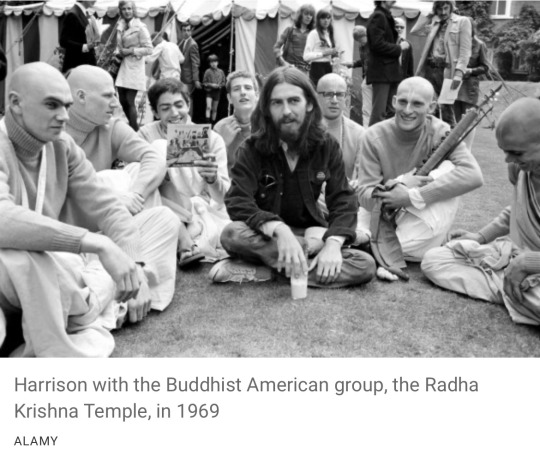
‘It was a transcendental experience that was beyond the mind’
On taking LSD
LSD was just such a violent, big experience. Before it I was totally ignorant, and afterward I knew I was totally ignorant and I was now on my way to having some sort of knowledge. I related it to the childhood experience of Catholicism and going to church on a Sunday and seeing all that phoney baloney. The moment I’d taken LSD, it just made me laugh because I understood it inside, just in a flash. I understood what the whole concept of God or religion was just by seeing it. I could see it in the grass in the trees.
It was an absolute truth; like a light going ching. I took three very powerful trips — big, very important — and then it left me a bit unsure because I had to try and figure something out. By that time I had gotten into Indian music and spent time in India, [and] there was so much about it that felt like home to me. Not the surface that you see — all this poverty and the flies and the shit everywhere — [it] went beyond all that. Smells in the atmosphere and the people’s attitude and the music, the food, the religion, everything about it … home.
‘I’d hear his voice wailing at five in the morning’
On the death of Brian Jones of the Rolling Stones
I liked Brian a lot, and later on, I realised it was probably because we were both Pisces. We both had similar natures. He was also similar in that he had a Keith and a Mick, whereas I had a John and a Paul. We both had that problem of two mighty egos to deal with in order just to try and survive. I was very susceptible to dope, and Brian [Jones] was even more susceptible. He’d come [to my house], and I’d just hear his voice wailing at like five in the morning: “George, Geeooorrgggeeee.” So I’d wake up, see what was going on, and I’d look out the window, and he’d be all white and just shattered walking around the garden — just looking for somewhere to be.
I would always meet him at that time of day and just try to calm him down. And I saw him a lot before he died in that sort of circumstance. The last time I saw him, I think, was when I’d been in hospital to have my tonsils out and he came to see me in hospital and the next week he was gone. He was like all of them who kicked the bucket — it was sad because there were too many pressures, really. Not just the pressure of being famous and having the press hounding you day and night and young fans hounding you day and night. Plus the drugs hounding you day and night.
‘F*** it — I could do better than that’
On his childhood inspiration, Cliff Richard
I remember being a kid of about twelve, dreaming of big motorboats and tropical islands and things which had nothing to do with Liverpool, which was dark and cold. I remember going to see Cliff Richard and thinking, f*** it — I could do better than that.
‘I think being Elvis was lonelier than being one of the Fab Four’
On fame — and Elvis Presley
We kept realising we were getting bigger and bigger until we all realised we couldn’t go anywhere —you couldn’t pick up a paper or turn on a radio or TV without seeing yourself. I mean, it became too much. We became trapped, and that’s why it had to end, is what I think … We were like monkeys in a cage. I think it was helped a bit by the fact that it was four of us, who shared the experience. I mean, there was more than four of us, there was Peter Brown and Brian Epstein, but there was only four of us who were actually the Fab Four — whereas Elvis had an entourage and maybe 15 guys, friends of his, but there was only one man having that experience of what it was like to be Elvis Presley. I think that was far lonelier than being one of the Fab Four because at least we could keep each other laughing or crying or whatever we did to each other. It was definitely an asset being in a group.
(source)
151 notes
·
View notes
Note
can vamp Tim give Jason a blood transfusion if needed? 🤔
in your vamp/wer verse I mean
Oh, that's an interesting question! In my vampire!Tim/werewolf!Jason verse and the accompanying fic, Tim drinks almost exclusively off of Jason because a) Jason loves it and b) Tim would near-starve himself otherwise :') (and he kind of does anyway, Jason has to bully him into feeding). So the only blood inside Tim at any given moment is usually Jason's original blood anyway. But can Tim give that blood back in an emergency?
tldr: yes, under certain conditions. lol
My reply was getting long because this kind of speculating is my favorite game to play, so if you're curious about what those conditions are and how I reached that conclusion, more details are under the cut:
In this verse, Jason is the kind of werewolf who doesn't have a lot of control/retained personality when he shifts, but he DOES have a lot of meta powers. (As a treat for becoming a mindless, violent monster lol ur welcome Jay)
One of those powers includes rapid healing ala deadpool/wolverine (unless the wound is inflicted by silver, ancestral or otherwise) so it would be remarkably difficult for Jason to reach the point where he even needs a blood transfusion. But let's consider that worst case scenario, in which Jason has suffered enough silver-inflicted wounds that his healing factor breaks and he needs blood, yesterday. Wuh oh.
Tim is the #1 candidate to consider for a Jason blood transfusion because that's his gamer fuel of choice - but for Tim to be a viable donor, it would depend on the length of time it's been since Tim drank from Jason, and how much. They're on a time limit because Tim's body doesn't replenish blood on its own, he has to steal it.
Brace yourself for the suspect use of rough science facts in the middle of supernatural fantasy speculation about vampire/werewolf AUs, lmao
So supposing Jason has about 12 pints/5.7 L of blood in total, he could lose maybe 5 pints/2.4 L of blood at a time without dying (and that's a high estimate, he'd start going into shock way before that lmao), AND it would take him weeks to restore that blood - if he were human.
Luckily for Tim, he can steal quite a bit from Jason without killing him because of the handy dandy werewolf healing factor that restores Jason's blood almost as fast as Tim's dusty ass can absorb it. (Tim's veins @ Jason's blood: 𝔪𝔬𝔦𝔰𝔱𝔲𝔯𝔦𝔷𝔢 𝔪𝔢). Unluckily for Tim (and Jason), Tim has about a zillion hangups over drinking that much all at once. Aw.
A brief google search tells me that in an average human body, red blood cells live about 120 days. For simplicity, we'll say that Tim being a vampire and having weird vampire powers counteracts Jason being a werewolf and his blood having weird werewolf properties - so when Tim is full (and I mean full) of Jason's blood, he's good for somewhere just under that 120 days.
The blood isn't immediately starving in Tim's stupid vampire body because it's strong, sexy werewolf blood; it stays hydrated for a million years and could thrive like a dandelion in a crack in the sidewalk, let alone a perfectly good, albeit abandoned, vascular system. (Jason's blood @ Tim's veins: 𝒾𝓉'𝓈 𝒻𝓇𝑒𝑒 𝓇𝑒𝒶𝓁 𝑒𝓈𝓉𝒶𝓉𝑒)
That being said, Tim starts getting very hungry near the end of that time frame as the blood is used/dies, and that time frame shrinks every time he bleeds (which is often, RIP Tim). But he'd still have a solid month or so of healthy, viable Jason blood pumping through his undead ticker. (unless Tim gets REALLY beat up lol, which is not unlikely OTL)
SO all this to say: can Tim give it back?
I would say yes, IF Tim has fed recently, and he's fed A LOT. Otherwise, he just straight up might not have the blood to give anymore because his stupid husk of a body already used it all.
If he tried to give Jason blood around the time he's getting hungry again, when Jason's blood is on it's last legs after sustaining an active vampire without reinforcements for weeks to months, it wouldn't be as effective as a blood transfusion from someone who can make their own blood and therefore has a fresher supply.
tldr (again lol); Tim could become a blood donor for Jason, but only once he's regularly letting himself drink from Jason, and drinking until he's full.
#this is also how i feel in general about how vampires with magical blood solutions should work#like yeah you don't have to kill anymore because i'll sustain you and neither of us will die because my magic blood is so strong and sexy#but also if i need that back then the stars have to be in position#and you DO still need to take from me with regularity#you DO still need quarterly if not monthly blood donations to live. you are still going to feel like a burden#oh the chronic disease of it all#fjdlasfjs ANYWAY I took a zillion years to answer that question but I love speculating about the how and why so lol ty for the opportunity#i love digging into worldbuilding and what exactly the magical bullshit is capable of solving and defining the rules#jaytim#not!fic#asked and answered#deepwithintheabyss#werewolf jason#vampire tim
38 notes
·
View notes
Text

Did Li Qingyun, a Chinese medicine scholar who married 24 wives, really live to be 256 years old?
Interesting, when I ran across this article Li Qingyun living 256 years is incredible. The article first appeared in the New York Times. I'm not sure about how accurate it is, but it does show the human spirit and how powerful we as humans can be.
Li Qingyun (1677~1933), a traditional Chinese medicine scholar who lived through the Qing Dynasty to the early Republic of China, experienced 9 emperors in his life, married 24 wives, raised 180 children, and lived for 256 years.
It may be difficult for everyone to imagine that such a person's story was reported by Time Magazine and the New York Times in the United States in 1933.
Li Qingyun is also known as Li Qingyuan.
He became famous thanks to a warlord named Yang Sen during the Republic of China. In 1927, Yang Sen knew the story of Li Qingyun's longevity, so he invited him to Wanxian, Sichuan as a guest.
At that time, Yang Sen was deeply attracted by Li Qingyun's old strength and superb skills in collecting Chinese herbal medicine, and Li Qingyun's story became known to the public.
When Li Qingyun died in 1933, Yang Sen specially sent people to investigate his true age and background and published a report.
Some Sichuan people said when interviewed that they had known Li Qingyun when they were children, and that Li Qingyun still did not become very old when they died. Others said that Li Qingyun was once their grandfather's friend.
When Li Qingyun was alive, he could accurately name people, places and other things in the past 200 years.
According to the New York Times, in 1930, Hu Zhongqian, dean of the Education Department of Chengdu University, also discovered Li Qingyun’s birth certificate. He believed that Li Qingyun was born on February 26, 1677, and that the Qing government in 1827, the seventh year of Daoguang, A 150th birthday celebration was also held for him.
According to Time magazine, he also has 6-inch-long nails on his right hand.
He had a Tai Chi master disciple who said this about his master Li Qingyun in his autobiography:
When Master Li was 130 years old, he met a hermit in the mountains and learned Baguazhang and a set of Qigong from him, including breathing methods, training and dietary guidelines using special sounds to coordinate movements, and regular The correct and sincere training lasted for 120 years, so it will live long.
Many students of Kowloon Baguazhang also believe that their palm skills were learned by Taoist Li Qingyun.
Li Jiangyun died on May 6, 1933. He was buried in Lijiawan, Yixue Village, Changsha Town, Kaixian County. He lived in Kaixian County for 110 years. According to the available information, it is proven that Li Qingyun was at least 170 years old.
The grandfather of Li Guangsong, a native of Lijiawan, Changsha Town today, was Xiang Jiyang. He was born in 1819 and died in 1912. He was the young man who once carried medicine for Li Qingyun.
When Xiang Jiyang was 14 years old, he helped Li Qingyun carry medicine. At that time, Li Qingyun looked like an old man in his 50s, which meant that he had lived for at least 170 years.
According to him, the reason why he lives a long life is because he devoted his life to studying Chinese herbal medicine and the secret of longevity. He once traveled to Gansu, Shaanxi, Tibet, Annan, Manchuria and other places to collect ginseng, Ganoderma lucidum and other herbal medicines.
And I have been a vegetarian for a long time, keeping my heart calm and cheerful, and drinking wolfberry tea all year round.
The secret of longevity he left behind is: maintain a calm mind, sit like a turtle, walk like a bird, and sleep like a dog.
14 notes
·
View notes
Text
Yusei Fudo x Chubby Reader pt.1
Sorry for errors
I accept story requests.

You met Yusei in the middle of the night. You moved back into town once again. You hated moving then coming back to the same town. It was very annoying and frustrating. People come and go. “I didn’t ask to come back to this fucking place so don’t act like the decision you made was for me!” You yelled at your parents. You grabbed your purse and left the house. It was late. The street was wet and there were no stars in the sky. You continued walking. You weren’t lost. After all this is your home town you left and came back like 10 times already. It’s been 2 years since you’ve been there. At a distance you heard motors. A gun went off and the race began. As you crossed the street you paused seeing two duel runners pass by. You locked eyes with a guy a gasp leaving your throat. Once the moment happened you were shocked on how easily you could’ve died especially having an argument with your parents. Not getting a chance to say I love you nor Goodbye.
The following day
As you roamed the halls you bumped into many people. You were short and chubby. Not a good combination you thought. You finally got to your locker. “….excuse me your blocking my locker.” You spoke to a guy with blonde hair. He ignored you. “…excuse me sir.” You said once again. He looked down at you then went back talking to his friend. You’re a short tempered person. You’ve been working with patience. “ EXCUSE ME YOU’RE BLOCKING MY LOCKER.” Kicking his shin as you yelled. He groaned kneeling down rubbing his leg. “ you fucking fat ass that hurt!” He responded. Wherever you went people bullied you. They saw you as an easy target. You frowned putting your science and art journal away. “ you don’t get to be upset ugly. You kicked the living hell out of me. Do you have any idea who I am!?” Jack said. You held your tears back. You dominated your feelings. “Hey leave her alone. It’s not a big deal Jack.” Yusei commented. As you looked at each other everything went silent. It was him. The guy that was dueling. “Yeah whatever. You better watch your back loser.” Jack said leaving to his class. You noticed he put a box in his pocket. His dueling deck? “Sorry about him..that’s Jack Atlas. Not a very friendly guy. Do you need any help finding your way to class?” Yusei asked. “No I know where Ap Spanish Language is at. Thanks for standing up for me I appreciate it.” You said and ran along to class.
You sat down at the desk near the window. Loving the warmth of the sun. The last bell rang as the teacher told everyone to settle down and take out their journal and textbook. Yusei walked in, “ Yusei porque llegas tarde?” The teacher asked. You turn to face Yusei just as everyone did. “ Olvide mi libro.” He responded. He sat next to you. A group of girls whispered and shot a few glances. “Hoy van a responder las preguntas de las páginas 120-135 con su compañero.” The teacher said then sat down at his desk. “Alright…uhh?” “Oh I’m y/n” you responded. “I’m Yusei. Alright Y/n. Let’s get stated.” He replied. You both began the assignment. It was easy and difficult at the same time. You guys exchanged a few jokes. It was a fun class.
Days went on and these stupid group of girls wouldn’t stop bothering you. Of course you always end up crying or being saved by Yusei.
“You should stay away from Yusei. He doesn’t like girls like you. Like you being a blob of fat and with really ugly glasses. Word of advice stop eating and wear contacts.” Emi said soon after releasing the grip off your hair. You cried. This was every morning and evening. You walked home. Alone. Crying. “Hey y/n!” Yusei called out to you. You turned and waved. “Hey come with me. I’m dueling today. Come watch me. It’s so much fun.” He said dragging you along to the where the duels happen. Many people were there. “Don’t say Hi to anyone. Stay close alright.” He ordered. Walking through the crowd was scary. Some guys had tattoos or piercings or both. Girls were dressed up like they don’t own jeans or regular tops. They all looked like they had their own gang. You were correct. Yusei was one of the best and most popular duelist around. His is why girls were so jealous of you. Walking with the Yusei Fudo and your holding onto his arm.“Yusei?” You said holding his arm. “Stay quiet.” He said. Almost scolding you. You nodded after what felt forever you both reached your section. His friends all greeted him. You stood behind him feeling shy. “Yusei why did you bring his blob of fat here?” Emi asked with an angry tone. Everyone tolerated her due to how much money she has. Daddy’s money to be exact. “Don’t talk about her that way. She’s my friend and she’s very beautiful.” He responded. “Yeah…anyways you’re up.” She responded moving out of the way. You saw his duel runner. “Woah. This is yours?” You loved the red color. “Yes it’s mine. Do you want to ride?” He asks handing you an extra helmet. Before you knew it you were on the runner with him racing. You held onto his waist. “Relax, feel the wind blowing.” He said after making his move. You relaxed a bit then fell in love with the feeling. You giggled. “THIS IS AWESOME!!” You yelled as the speed picked up. He looked back at you. He loved your rosey cheeks. How your eyes sparkled. The way you giggled. After a few minutes the Duel ended with Yusei as the victory. “That was such a ru-“ you said being cut off by many girls surrounding him. You got pushed back getting comments such as “move fatty.” “You’re taking up so much space.” “Ugh piglet get out of here.” “What do you eat. Move it.” “How did you mange not to make him lose control of his runner you hippo.” Once you were all the way back tears ran down your cheeks. “You should lose a lot of weight and I mean ALOT of weight. Y/n no one will ever like you looking like that. You have a big stomach..your thighs can basically break anything. Your arms look…ugh. I’d die if I woke up looking fat one day.” Emi said making you cry. Your feelings were hurt. You walked away looking for an exit. “ Need a ride home?” Jack asked. You wiped your tears. “ N-No I don’t need your help.” He rolled his eyes making you sit on his runner. “You were about to walk into another groups section. Being from our team and alone. You’re an idiot. Fat added on that. You need my help.” He drove fast. “873 Asher drive.” You said crying. He’s helping you and being an asshole. “Quit crying loser. Toughen up. No one likes a baby cryer.” He said speeding up like never before thinking it would scare you. You smiled enjoying the rush. “Faster!” You yelled letting go of him raising your arms to the sky. He was shocked but listened to your command. Jack smirked. “Alright fatty see if you enjoy this!” He yelled driving faster. You saw the bridge that was broken in the middle. He jumped over. “ YEAH!!” You yelled laughing. Once you got home your hair was an ugly tangled mess. “I thought I’d scare you.” Was all jack said. “I love the rush. It makes me feel alive. Nice try.” You walked inside. Your parents looked at you upset and worried. “It’s late!! Where the hell were you?”your mom yelled and then embraced you. “Who was that guy you were with?” Your father asked. “I was watching my friend duel. I’m okay. It’s fun.” You replied with a smile on your face. They were shocked.
#fanfiction#anime#anime and manga#fanfic#yusei fudo#jack atlas#yugioh x reader#yugioh 5ds#yugioh#jaden yuki#yugioh kaiba#seto kaiba#yugi moto#yami yugi#joey wheeler#yami marik#yugi mutou#x reader#anime fanfic
31 notes
·
View notes
Text
initial thoughts on DCAS episode 16

... is Derek really an incel? like, at the very least, shouldn't him being with Kristal prove that he isn't an incel? i have no qualms with Emily insulting Derek, but she should at least be accurate.
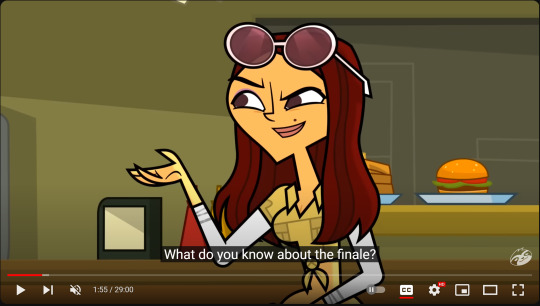
ooh, Emily going full villain mode? we stan :D
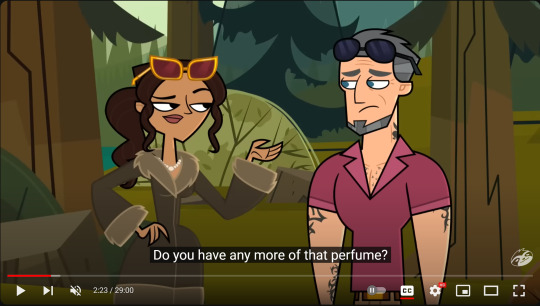
girl how would you possibly think this would work
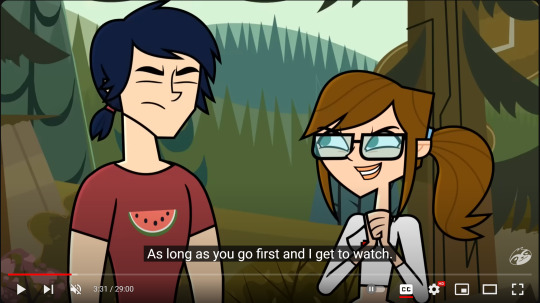
so Ally has resorted to playing a fully emotional game, huh? you either get eliminated a hero or live long enough to see yourself become the Jake.

the music in this scene cracked me up. also, i think aleriya is (canonically) dead after this scene, if it hadn't already died beforehand. (i say canonically bc fans can do whatever they want)
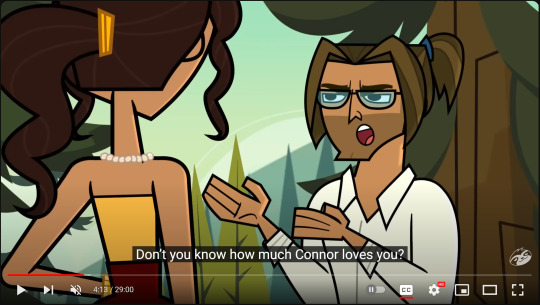
d-does he still...? also, obligatory "just because Connor loves Riya doesn't mean she has any obligation to love him back, villain or not."
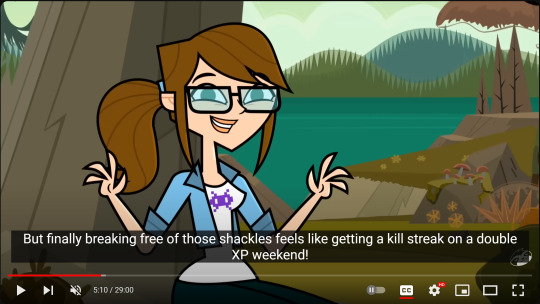
i really can't tell if this part of Ally's character arc is meant to be viewed as good or bad. like, the show is obviously telling us that Ally's overall trajectory is bad, and being needlessly cruel to other people for the sake of putting your own emotional wellbeing first could certainly be a part of that. but, there's also been a lot of commentary about how hard it is to be under the scrutiny of social media (likely from the crew's own experiences), so Ally learning to stand up for herself and what she needs could also be a form of wish fulfillment. hopefully it'll resolve as a multi-layered predicament in the end, but i'm just trying to figure out how Ally will respond to her edit in All Stars in either the finale or the Loser's Motel episode.
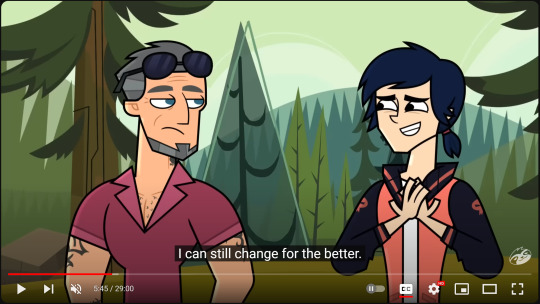
...can't you just wait, like, two more episodes to directly state the point of your character arc, essentially then concluding it? then i could be sure that you'd win.

HELP

lmao of course the nerd can't rock climb. he can carry 120 pounds on his back but he cannot ascend.
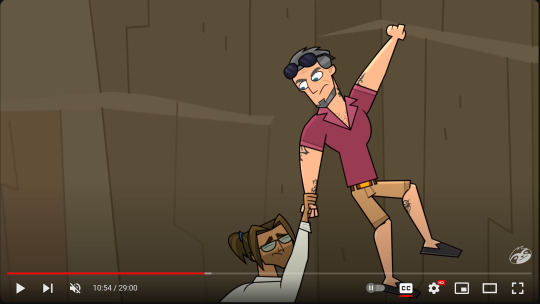
Connor is really fucking strong goddamn?

Ally really can't fight this, because this is the exact rationale that she was trying to use on Jake for their entire games.

i want to see people draw buff Grett in the style of the buff Natsuki meme from DDLC. but, also, go Grett!!!

the intense difficulty of a twelve piece jigsaw puzzle. Venus noted that it really sounded like Kristal was describing a slide puzzle, but I understand why that would've been really difficult to storyboard.
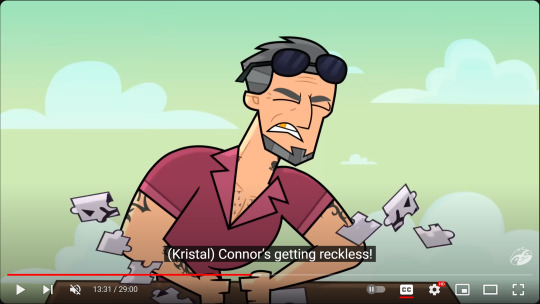
Connor you can't be this stupid (/j)

in-universe, i don't really understand how she beat Alec (he was really good at the block puzzle in s1 and it fits his vibes), but yay Grett! i knew she wasn't going home tonight anyway.
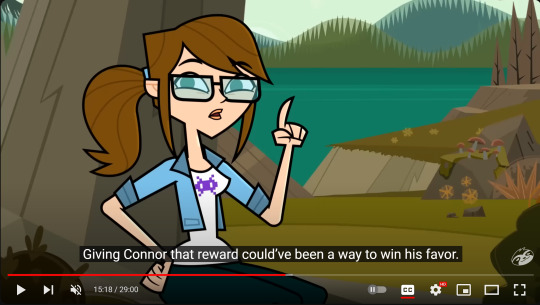
what else could it have possibly been, Ally? regardless, we're definitely setting up the pieces for Grett's downfall soon.
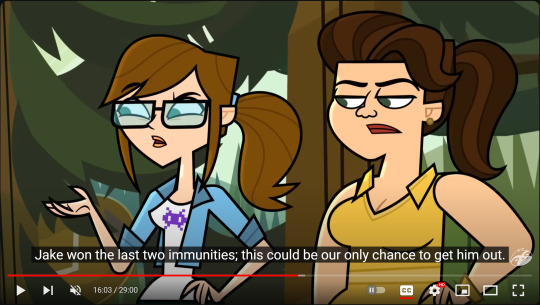
can you really count the TikTok challenge as a "Jake immunity win"? literally everyone except Gabby and Grett won immunity in that challenge.

for a moment, i really thought Connor was going to pull the Kim Possible "out there... in here..." thing.

so true Jake
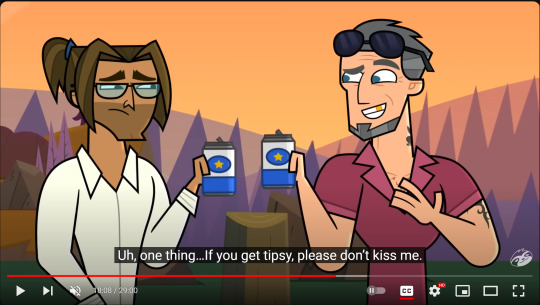
this feels like a fanfic line
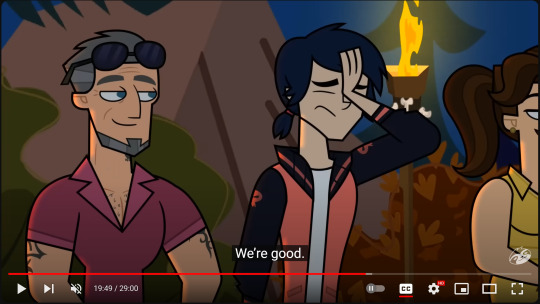
you know Jake's having flashbacks to his last final 6 experience.

well, while i certainly thought that it was Riya's time to go in terms of the cut, it does actually make more sense for Alec to go home here, no plot armor involved! (other than arguably the plot armor of not letting Alec win the challenge.) Alec is much more threatening in a final 3 situation because of his greater athleticism and intelligence as compared to Riya, and Grett is closer to Riya than Alec. it sucks to see one of my favorites go, but it's entirely logical.
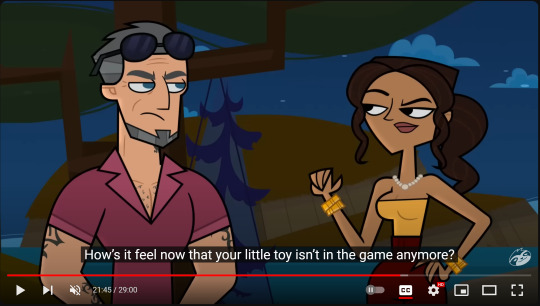
Riya out here projecting ("little toy")
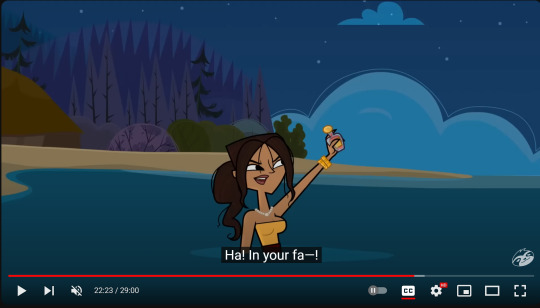

this was such a good moment. i especially love the storytelling without dialogue going on with Connor's reaction. anyways, if Riya wasn't going to win before, she's definitely not going to win now. you don't get hit with the "look at what a sorry state you're in" three episodes before the final and then snatch the W.

maybe you shouldn't have fired and humiliated your employees live on TV, then.

is this season going to end with Kristal resigning from the show? i thought that might happen to make way for Emily as the new host, but now that she's going more villainous, i don't think that'll be the cast anymore. maybe Derek and Trevor will take the show back over, as (I think) the more popular hosts in the fandom?
anyways. a solid episode! i think a good number of people saw the Connor idol play coming from a mile away, so it wasn't all that surprising that one of the major villains was going down. still, we had interesting strategy and some great character moments, especially for Connor. they're really making the best of his extended time in All Stars. and, hey, there are only two guys left, so maybe he'll make the finale! it doesn't really matter, though, because it's gonna be Jake. i'll keep riding the Jake winner train until he gets eliminated. not that i think that's going to happen ;)
see you next week!
#disventure camp#disventure camp spoilers#dcas#dcas initial thoughts#i did also get spoiled on the outcome of this episode which may be part of why i sound less excited about the elim than i might have been#i didn't get the surprise factor but it did also help me see how this was a good final act for the boot#other than whatever they'll be doing in the losers' motel#hehehe... loser's motel
14 notes
·
View notes
Text
Shadow Magic Ranking (5e)
Guide
1=useless
2=often useful
3=sometimes useful
4=perfect
Eyes of the Dark 4 Darkvision is important in a game that often includes a lot of dungeons caves and other poorly-lit locales. 120 ft. Darkvision means that you can safely attack other enemies with Darkvision while remaining outside their vision range. In places that are well lit (like outside, if that’s somewhere that you go for whatever reason), casting Darkness using Sorcery Points means that you’ve got a fun little bubble where you (and often ONLY you) can see normally. Darkness is a 2nd-level spell and converting a 2nd-level spell slot to Sorcery Points gives you 2 Sorcery Points so all that it costs you is the Bonus Action to make the conversion
Strength of the Grave 3 this might keep you going if you’re dropped by an attack that doesn’t deal a lot of damage but against abilities which deal lots of damage all at once like breath weapons or spells it’s going to be very difficult to make the saving throw
Hound of Ill-Omen 4 rven at high levels when the Dire Wolf stat block won’t be threatening forcing Disadvantage on saving throws means that you can easily hit the target of your hound with a save-or-suck spell immediately after summoning the hound. The hound also moves unerringly toward the target so if they become invisible you have a great way to locate them. The hound can move through objects (though it can’t fly) so even solid walls won’t stop this thing once you summon it and it has enough hit points that it can suffer a few attacks before it dies. In essence this is Heightened Spell attached to a very determined set of teeth and unlike Heightened Spell the target suffers Disadvantage on all saves against your spells rather than the first save for an affected spell. As an example: you can target a creature with your hound then hit it with Hold Monster and it will make every save against Hold Monster at Disadvantage. Even better your wolf will attack it with Advantage and score automatic critical hits (provided that it hits which is still a problem against high-AC foes) since the target it paralyzed. Curiously there’s no limitation on how many hounds you can have beyond the Sorcery Point cost. If you want to summon a hound every turn until you run out of sorcery points you’re free to do so. If you want to get multiple hounds on the field then upcast Hold Monster to paralyze a bunch of things that’s a thing you can do. Now your foes might decide to try killing the hound but any attack against the hound is damage not taken by your less instantly resummonable party members. One more fun little tidbit even though it’s called “Hound” you can just decide it’s whatever you want. A black cat bringing bad luck a totally rad dinosaur a horrible goose. Flavor is free
Shadow Walk 4 free teleportation as a Bonus Action! The range is pretty good and in a pinch you can cast Darkness to create an area in which to teleport. You can even use this while travelling allowing you to move roughly 5 times as fast as normal by combining a comfortable walking pace and frequent teleportation
Umbral Form 4 what if Rage let you cast spells and walk through walls instead of hitting things really hard? That’s kinda how this works. The Sorcery Points are cheaper than casting many spells which let you walk through walls and creatures like Etherealness. Hopefully you won’t need the damage resistances because you have great defensive options like Improved Invisibility but you might be able to use Umbral Form before polymorphing and maintain the damage resistance
Final Ranking (do I even need to say it?) 4 powerful and versatile with a good mix of abilities Shadow Magic is at its best in the dark. Even in areas of bright light the magical darkness rules will give you a massive tactical advantage over anyone except devils and the handful of warlocks who have the Devil’s Sight invocation. Hound of Ill Omen makes Shadow Magic an ideal save-or-suck caster providing an easy and relatively inexpensive way to impose Disadvantage on targets’ saving throws. While your spell selection isn’t so broad as subclasses Aberrant Mind and Clockwork Soul the sheer incredible power of Hound of Ill Omen allows you to thrive with a very small spell selection
0 notes
Text
"The K in hippocratic oath stands for Kimiko, now please stop questioning the syringe of fluid in ny hand. I promise it's good for you."

Character details:
Letter: K
Code name: Kimura
True name: Kimiko Kujo
Pronouns: She/Her
Age: 17
Birthdate: March 21
Orientation: Bisexual
Home country: Japan
Likes: lizards, microbiology, helping people she deems "worthy"
Dislikes: horror films, minimalist decor, "difficult persons"
Extra: K arrived at Wammys fairly young and had been pursuing a medical career prior to the L program. Her parents were both doctors and died in a lab accident while working on a top secret infectious disease program. K had been given extensive private schooling and was far above any other child her age. Subsequently, Mr. Wammy, who had been good friends with her parents, brought her to Wammys House so she could continue her studies. K genuinely believes in the Wammys House system and L program, even though she is not at all considered a proper successor. Brilliant and loyal as she may be she is headstrong in her sense of justice and should never be left alone in a lab.
Appearance:
Hair color: Light brown, long and straight, often kept in a tight bun or pony tail but occasionally let down
Eye color: Black
Skin tone: Warm beige
Height: 5'7 (170cm)
Weight: 120-130lbs (54-59kg)
Fashion sense: Extremely formal. Usually wears black or white and rarely dresses in color but typically wears muted blues or greens. Often wears her lab coat around during busy weeks.
Extra: Sometimes wears a small peice of jewelry, but nothing to flashy. Her appearance is fairly sterile overall.
(=Rules under cut=)

Mun:
The man behind the muse is @artificial-ascension
That's my main personal blog and everything about me is in the pinned post. If you don't feel like going there:
Michael
20
He/they
My other rp blog is @fairweather-fangs I made a separate blog for my other muse because I like theming my blogs
Activity:
I am very active on Tumblr and try to be here
If I have alot of asks or RPs going on at once it may take a while to get to all of them, but trust me I do see everything.
I may get writers block for some things but I will try to get around to everything.
I'm very open about what I'm working on so if you have questions or concerns feel free to message me. If for whatever reason I will not be responding to your ask/response I will inform you
I'm in the Eastern U.S. but may be active anywhere from 5am (my time) at the earliest to 3am at th latest. (I have a terrible sleep schedule) However I am mich less likely to be writing or responding super late or super early. I may also be late to things if I'm away from my phone because I do that sometimes
Rules:
I don't mind most things, if you feel like you need permission to do something to K I almost certainly don't care
K often goes by Kimiko and her full name is probably available if you dig enough. If you're character is willing to find it they're free to use her real name.
NSFW is very much allowed but I require you to be 18+ for sexual material. Otherwise go crazy.
I don't like writing much... you wouldn't be able to tell because I'm quite long winded...
Really just try and not speak for K. That's my job, also I may do so on my other rp blog, but most K will go here.
And also don't be a dick. I try to be friendly but I don't fuck with any sort of bigotry in or out of character. And don't be rude to me I'll block you. I came here to have fun.
Trigger warnings: Comically absurd medical malpractice?? There's not alot here, pretty much just the average edgy wammys rp here.
Rules and warnings to be expanded upon as things come up. I'm new here.
#hello hello#there's way more K material to work with than F#F is loosely based of the L Change the World guy#K is. kimiko kujo. and the book actually have her something of a back story
0 notes
Text
Game Research 5 - Death Stranding / Subnautica
in death stranding, there is an event called timefall. To summarize, timefall is theorized to be clouds containing chiralium which freak out gamma radiation that are made by lightning. This essentially causes acid rain, which while trying to get from one location to another, the cargo that you are holding starts to break down and you need to move faster.
In my game, there isn’t acid rain, but there is poisonous air which limits the time you are able to spend outside until your player dies. You are 120 seconds ( 2 minutes ) to go around the map to find clues or a plant, then you need to retreat back to the observatory to regain air.


Subnautica

Here is the subnautica air tanks that you can find and upgrade. I have chosen to specifically research air tanks across multiple games. In my game you will most likely need and air tank so you don’t die from the poisonous air, but you can only stay out for a certain amount of time.
I researched air tanks to see how they are coded ( to see how complicated it is ) and how that are made ( to see how difficult it is to model ) Neither of them seemed too difficult, so hopefully this and an upgrading feature will be active in the final product of the game.

0 notes
Text

I did eden again today solo, and properly took the time to check out all the changes. And you know what? I liked it!
1. The statues have more emotion, and a lot of them are together now.. they died together 🥲 as you can see in my picture. And yeah even completely crispy dead you still stand up for the screenshot pose!
2. And there were more lamps through what used to be the continuous red rain zone. I ran eden last week with a buddy and it was really neat how we could sustain each other almost to the end of the map 🥰 But it’s still very possible to solo it successfully which is nice. The rain felt a bit lighter
3. The crawl was difficult, and the more wl you have the faster you lose it, but I think it balances out in the end. I almost made it to the last statue and I went in with maybe 120 wl. If I had my full 165 I could’ve done it
4. Sometimes it took forevvvvver for my lamp prop to become useable again. I like to stick it on a wall while I shelter but I think if a red rock destroys it, the cooldown is super extra slow.
After getting clobbered last week (though we did make it in the end) I feel confident in navigating eden again. This was almost a perfect run. And most importantly I enjoyed it!
#sky cotl#sky: children of the light#eye of eden#eye of eden spoilers#I felt kind of bad because kind strangers kept trying to help me and I had to charge ahead because I really wanted to focus on a solo run#but also I nailed the beginner shortcut first try!!#I don’t oob through but I do like being able to fly right to the first wl
22 notes
·
View notes
Text
Being Goth in the 80′s
“Beware! I live!” - Sinistar
“What was it like in the 80′s?” the baby bats often ask as their dark forms flutter about me, eyes wide and ready to drink up every last, minute detail - “The music from the 80′s is sooo amazing; if I had a time machine I’d be so there,” they’ll gush. “OMG, tell us EVERYTHING!” Very well then - here’s everything: No internet, no cell phones, no texting, no email, no streaming, no downloads, no Uber, no apps - oh my! If you had a time machine, the 80′s might be a fun place to visit, but trust me, once you saw your cell phone had zero bars, you wouldn’t want to live there.
Of course, to those of us living back then, we didn’t know what we were missing as those things were still science-fiction. So had anyone been asked how they liked the 80′s, they’d probably think things were going reasonably well, myself included. But lets zoom in and focus on what it was like being a goth in the 80′s. Yes, the music was amazing - but you had to find it first.
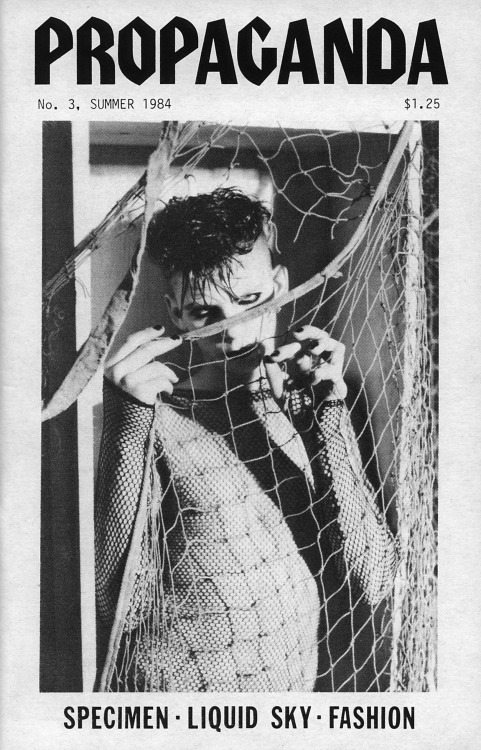
First off, getting any information about the goth scene was like blood from a stone. Rare, infrequent, and treasured. For most of the 80′s, we lived and died by Propaganda magazine. It represented about 90% of all the info you received regarding music / fashion / trends / style and it only came out 4 times a year. Ever wonder why there are so few Propaganda magazines copies floating about now? Because you read it and re-read it and then re-re-read it. Your friends read it and re-read it, and then their friends. Beverages were spilled on it. Photos were cut out of it and pinned to walls. Concert schedules were torn out. And it’s not like they were printed on the best quality of paper to begin with. It boggles my mind that any still exist today at all. By the time the new issue arrived in the mail, the previous one looked as though it had gone through a blender. The other big place for music info was the local record store.

For me, those record stores were Camelot and Sam Goody and yeah, they really looked like that. If you were lucky, someone who worked there was a sage and knew a little bit about everything, including goth music. I was lucky - very lucky. Michael, the assistant manager at my Camelot, was like a bio-Alexa. “I’m looking for something...dark,” I believe I mumbled at him one day. “Have you listened to this?” he’d ask, handing me a Bauhaus album. I shake my head ‘no.’ “Here”, he’d say, “Put on these headphones and have a listen.” And that was that. He hooked me up with The Cure, Siouxsie and the Banshees, Xmal Deutschland, and Joy Division, just to name a few, so I was all in from the early days. He knew when all the albums were going to be released and he’d order them for you (since those mainstream stores rarely carried them). I must admit, there was a tiny bit of cred to be had when you walked in and the person behind the counter recognizes you and says the special album you ordered has arrived and hands it to you. The third place to learn about music, was on telephone poles.
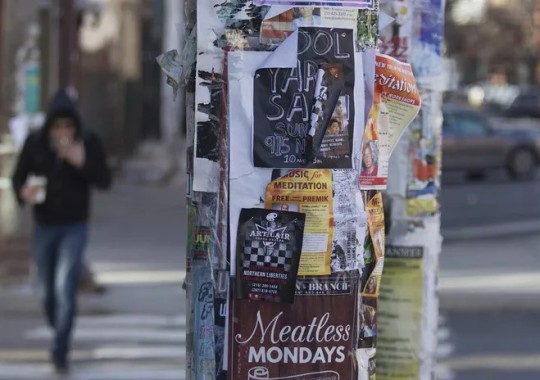
As far as I know, this hasn’t changed much as I still see band flyers stapled up around town, but back then, this kind of direct marketing was essential. Propaganda magazine and Michael at Camelot didn’t know when a smaller band like Strange Boutique was next playing at The Metro, but those flyers did. And wise was the person who stapled up several flyers at a time in the same place, because he knew we would tear them down to put up on our refrigerators at home so we wouldn’t forget. And while it was easy to see the small, local bands play live, it was difficult to see the big bands play live. The tours never seemed to come near where you lived. I didn’t even see Siouxsie & the Banshees play live until 1991 even though I had been listening to them throughout the 80′s. Your best bet to actually see the big goth bands was on MTV’s 120 Minutes.

Now, MTV was super mainstream and you’d rarely see a goth band on there (at least in the US), so the 120 Minutes program was progress. You might only see one or two goth bands on each episode, but that was better than nothing. I would record each episode of 120 Minutes on my VCR while I was out or sleeping. The next day, I’d fast forward through the show and find the goth bands and watch them a few times, and take my VCR to a friends so we could copy the good videos to save and share. Then the next week, I’d use that same VCR tape to record the next episode and so forth and so on. Eventually, 120 Minutes seemed to run goth stuff less frequently and I stopped watching. But by that point, I’d discovered that just like with music, you could order VCR tapes with hours worth of videos of Siouxsie or The Cure or whoever and I just mail-ordered those. And these videos were not cheap. I recall my Siouxsie VCR tape set me back $60, plus shipping. And this was in 1986, so that was big money. But what about the rest of TV?
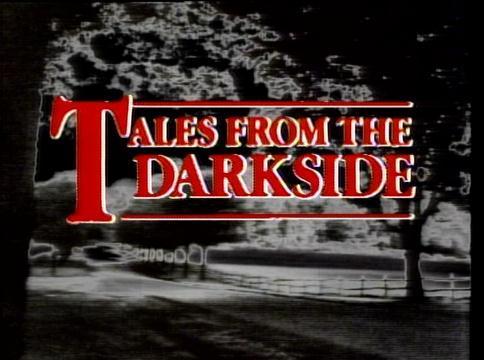
In general, TV didn’t have much to offer to goths in in the 80′s, so I consequently didn’t watch much. Some shows that come to mind are ‘Tales from the Darkside,’ ‘Monsters,’ ‘The Hitchhiker,’ ‘Friday the 13th, The Series’, The Twilight Zone,’ and ‘Elvira’s Movie Macabre’. Most of these shows were syndicated and tended to be on quite late, so I’d record them and watch them later. In general, I might watch just a few hours of TV a week. I’d be curious to see stats for 80′s TV viewership among goths, but I bet it would be low. They just didn’t make many shows for us back then.

The video game market may have crashed in 1983, but arcades didn’t go away and that was a godsend since they were great places for goths to loiter. Remember Michael from Camelot? When he left Camelot he became the manager of the arcade at the other end of the mall (yes, we really did spend a lot of time in malls). He was less useful for music, but now he became gaming useful. He’d let a select few of us into the arcade on Sunday when it was closed - and we played for free. With fresh batteries in my Sony Walkman, I’d spend hours at a time in the dark listening to my fav goth albums while racking up crazy high scores on games like Tempest, Wizard of Wor, Battlezone, Defender, Stargate, Berzerk, and Sinistar. Why would he let some folks play for free, you might ask? Because we would set the high scores others would kill themselves trying to beat for the rest of the week. There was method in Michael’s madness - that arcade was always packed. It broke my heart when I moved away in 1985 to leave that kind of privilege behind, but I’m sure Michael had no trouble replacing me on his weekly roster of ringers. I played a ton of home video games as well, and huge swaths of my free time were spent gaming away while goth music drifted out of my cassette player. It had auto-reverse, so I didn’t even have to flip the cassette!

Magazines were much more popular in the 80′s than now, and many of the goths I knew read things like ‘Heavy Metal,’ ‘Omni,’ ‘Creepy,’ ‘Eerie,’ and ‘Vampirella.’ Although not specifically targeted at goths, magazines like these had stories and art that were very dark and resonated well with darklings. At any given time, I might have subscribed to a half-dozen magazines and picked up more occasionally, which was fairly typical. Compare that to now when most folks don’t subscribe to any and even I only subscribe to one. As the 80′s wore on, you began to see more dark, mainstream magazines and graphic novels creeping out of the woodwork like ‘The Dark Knight Returns,’ ‘Watchmen,’ and ‘Sandman.’ The late 80′s also saw the beginning of ‘Zines that folks would self publish on their home computers and hand-distribute about town, I recall quite a few unsung ‘zines that were very goth, but they rarely lasted more than a few issues before vanishing. In addition to magazines, I read vast numbers of books in the 80′s since that was the best medium for finding darker fare. Anne Rice’s Vampire Chronicles books were stupid popular among everyone I knew, as were things like William Gibson’s “Neuromancer,” “Count Zero,” and “Mona Lisa Overdrive.” Unlike other mediums, there were so many great books available, most goths I knew had their noses buried within a book whenever you’d visit them, and folks’ personal libraries tended to be quite extensive. Movies were a different story.
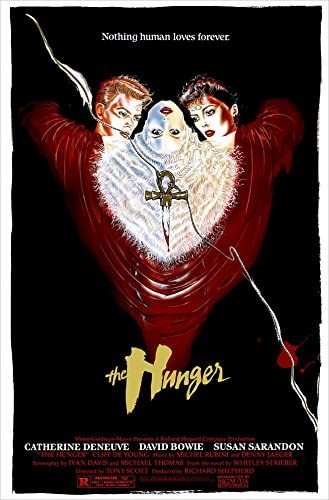
Goth films were so rare in the 80′s, you can just about count all of them using only your fingers and toes. It would be forever between goth films and I would often wonder if I’d ever see another one again. If there were so much as 2 in a year, that was a great year - I’m looking at you, 1988, when we got both “Beetlejuice“ and “Elvira, Mistress of the Dark!” Horror films and dark sci-fi largely filled the void, and fortunately, there were a decent number of those, so all was not lost. I still recall seeing “Aliens” and “The Fly” as a double-feature and that made for a good evening of dark entertainment. As far as fashion went, well, you’ve all seen the pictures online.

In the 80′s, casual goth was how you usually saw goths dressed. Everyday goth tended to be plain, compared to now. The most goth girl I knew in the 80′s, Ginny, usually wore black jeans, black Doc Martins, and a black t-shirt. In the winter, she’d throw on a long coat, a black beret hat, and a black & white checkered scarf - she always looked sharp! The pic above is representative of the fashion I would generally see in the 80′s. I believe this particular photo is from 1984, and this general style was common right through the decade. The girl on the left being more everyday goth while the girl on the right is more going-to-a-show goth. Hair was not always spiked up and depended on laziness. By the later 80′s, I didn’t see anyone doing it anymore. Tattoos and piercings existed, but they were not as frequent. Leather jackets and leather long coats were also seen, but not as often since they were expensive and most goths (myself included) acquired their clothes in second hand shops.

And there you go - I’m sure my goth 80′s were fairly typical, although individual experiences may vary. The modern ability to pull a cell phone out of your pocket and bring up any goth song, album, or music video ever made and watch it on the spot, then to check what bands are playing at any club, at any time, anywhere in the world, and then review the photos taken from that same club just last night to see exactly what they’re wearing in that neck-of-the-woods, is a wonder. Plus, goth music is easier to make and distribute now, so good bands are found faster by far more people to be enjoyed than ever before. There are more goth TV series, movies, and video games available than I can shake a broken VCR tape at, and again, I can watch or play them whenever I feel like it. I enjoy seeing current goth fashion as it’s so much more sophisticated and sublime than it used to be and goth decor exists in multitudes undreamt of in the 80′s.
So if you were to pull up to my place in your time-traveling 1982 Delorian, I’ll be happy to visit the 80′s with you to catch a show or two, but be sure to bring me back to today. There’s never been a better time to be goth, than now.
creaturesfromelsewhere 12/31/2021
#goth#elder goth#the 80's#goth music#goth fashion#propaganda magazine#camelot music#siouxsie and the banshees#the cure#xmal deutschland#joy division#strange boutique#the metro#heavy metal magazine#omni magazine#vampirella#delorian#time machine#baby bats#doc martins#the hunger#beetlejuice#elvira mistress of the dark#elvira's movie macabre#tempest#wizard of wor#sinistar#battlezone#berzerk#stargate
101 notes
·
View notes
Note
Hi, not sure if this had been asked before, but I'm curious about your opinion. Assuming he won't die during a battle, how long do you think Genos will live? I think a lot of people view him as some (semi) immortal being, who will surely outlive Saitama. But somehow I always thought the opposite, like isn't living in a combat cyborg body puts a lot of strain/stress on your brain? There's probably a significant brain disease development risk. I'm not a doctor or anything, obviously, just my thoghts 😅
Also, another similiar question: how long do you think it took Genos to fully adapt to his cyborg body and be ready to use weaponry?
No, it's not been asked before. This is the sort of question that really is above my paygrade to answer seriously, but let me take half a stab at it. Remember that I am oversimplifying a very complex subject matter horribly.
When you take all of life's insults out of the equation, and even inherent matters like genetic defects out too, then what governs ultimate age is a race between how long the fabric of our body lasts and how long our key tissues can self-renew for. The fabric of our bodies, the extracellular matrix that comprises the scaffold of our tissues is generally laid down ONCE! and then it just gets repaired as best possible but never renewed. Our lungs are generally good for about 110 years to give one example and likewise, our other tissues have a limit to how long they last. The other side of the equation, self-renewal, is especially critical for blood cells. When super-aged people die (110+ years), typically all their blood cells are found to be clones of what was literally their last hematopoetic stem cell. The upper estimate of how long a human being can live runs somewhere between 120 -125 years, but no one's been attested to have made it to 125 years yet (see note 1).
That's under perfect conditions. There are many many things that shorten lifespan. Trauma and infections are obvious ones, as are non-infections diseases, environmental exposure to harmful materials, and cancers, but chronic stress is a huge, huge life shortener. Whether it comes from the mere fact of being socially disadvantaged, difficult to resolve emotional or psychological distress, a sense of isolation, a sense of irrelevance (huge killer of older adults), a part of illness or starvation, ongoing financial difficulty, whatever its source, all of it accelerates ageing, depending on how intense, how prolonged, and when it comes into one's life. The right kinds of stressors can steal lifespan before one is even born, but again, that's outside the remit of this ask.
So, let's get to Genos. If tomorrow, his problems were to be resolved satisfactorily and he's in a good place socially, financially, and emotionally, how long could he live? A big part of that depends on what body he has. If he has 'only' his brain, then his life expectancy is on the order of 1 - 2 months as there's no possibility of renewing the all-important blood cells. But if that were the case, leaving the lab for more than a few days at a time would have been impossible. If he's built on the same sort of terms as Erimin and Destro (with just under a tenth of their bodies left), then he may have enough body to self-maintain and self-renew and then he'll have the regular constraints of a human life, barring any accident due to being a cyborg.
But there's more. Stress-wise, Genos has been burning through his lifespan at a terrifying rate. It doesn't help either that he grew up poor -- childhood poverty is a big thief of lifespan. Hard to say, but if things get better for him soon, somewhere between 50 and 70 years should be achievable, if nothing goes wrong. Which is not bad for a guy who was supposed to have died at 15.
And say what one likes, no one can accuse Genos of taking tomorrow for granted.
Asides
A reasonably accessible review on the matter https://www.nature.com/articles/d41586-022-00070-1
The influence of childhood experiences last a lifetime https://www.nytimes.com/2001/05/07/us/nuns-offer-clues-to-alzheimer-s-and-aging.html
Increasingly, you'll not just hear of lifespan, but healthy lifespan, the length of time one can expect to live before experiencing life-limiting chronic illness. There, environment and social standing make a huge difference. For example, in England, people living in the least deprived areas can expect nearly 20 years more healthy life than those in the most https://www.ons.gov.uk/peoplepopulationandcommunity/healthandsocialcare/healthinequalities/bulletins/healthstatelifeexpectanciesbyindexofmultipledeprivationimd/2018to2020
A more popular (https://www.apa.org/monitor/2014/10/chronic-stress) and more scientific (https://www.ncbi.nlm.nih.gov/pmc/articles/PMC3428505/) overview of the influence of stress on ageing.
Finding a reasonable article on the influence of the extracellular matrix (the scaffold that makes up our tissues) on ageing and organ function that's neither woo nor excessively scientific eludes me for now. In the meantime: WEAR SUNSCREEN! EVEN IF YOU'RE BLACK! Your skin will not recover from the extrinsic ageing of sun damage and your future self will thank you.
#asks#Genos#how long will Genos live?#In short: hard to say but no longer than a regular person at best#that's life!#he's not sitting around fretting about how short his alloted life might be#but is living every day to get as far as he can with the things he wants to achieve#and that's probably a healthier way to go about it than existential worry#One Punch Man
15 notes
·
View notes
Text
Structural Functionalism as a Biological Metaphor
Something that I found to be extremely interesting was the metaphor that structural functionalism compares humans to an individual cell in the human body, each a part of a larger organ system. As a student of biology and anthropology, this was a comparison that made a lot of sense to me and I began to think of it as a metaphor that could be developed more when viewing structural functionalism, and what that would mean in our society today.
In the human body some cells have more decision making power and operate more functions than other cells. For example, a singular nerve cell may be about a meter long and be vital in the body's decision making process. Similarly the individual cells that make up the brain have much more power to control the decisions of the body, as the signals that they create drive things such as the heartbeat and breathing. The cells of the brain are also very picky about their energy source, requiring glucose energy. If there is a lack of glucose in the body, the brain cells will divert this energy from going to other tissues because they need the energy in order to run the more important functions.
Other cells such as the red blood cells work in such a way that as they develop they lose organelles that allow decision making as well as DNA. The sole function of the red blood cell is to pick up and circulate oxygen throughout the body. The turnover rate of a red blood cell is also very great, only lasting in the human body for about 120 days and the body is producing these cells at a great rate.
In these examples the brain and nerve cells which are fewer in existence than other cells in the body, function to represent the elites of society, the ones who have money and are the main policy makers. These people, though they are still only a part of a larger system, have more ability to make decisions and control what is happening in society. They have money and are able to divert the resources to themselves and whoever else they deem deserving of these resources. These people are, in reality, given the ability to decide whether or not the society lives or dies. In contrast the red blood cells represent the working class and the poor who have very little ability to decide what they do, much less what the society does. If a red blood cell stops doing its job, it will nearly immediately be eaten by a macrophage. Similarly if someone in the working class stops working, they no longer have means to live and will likely die. Just as the red blood cell has a short life span in the body, because of the difficult working conditions that these workers put up with, their lifespans are shorter. Another similarity exists in the idea that red blood cells are performing the manual labor of the body. While the brain cells sit in the executive office making phone calls and decisions, the red blood cells are the ones running around carrying things. If the red blood cells collectively stopped working the entire society would fail. In our society today, if the manual laborers stopped working, things would begin to fall apart.
Structural functionalism’s idea of each part working as a part of a greater whole, does a good job in recognizing the reliance of each person on each other. I think that it is important to specify however that this involves the reliance of each group on the other as well, but in this I think that it is even more important to note how structural functionalism can show the disparities that exist between different groups and systems that contribute to the whole. In the human body, the red blood cells don’t actually have feelings or families, and the brain is really functioning to do what is best for the body as a whole. However in real life, the working class are people with the ability to feel, and they have people that they care about, while most of the time the elite and the executive class of people tend to do what is in their own best interest and not that of the society that they are controlling.
2 notes
·
View notes
Text
Vyzerre The Hive Knight
Thanks to a CERTAIN ASSHOLE IN MY DISCORD who got me addicted to Corruption of Champions and CoC2, I’ve been playing it nonstop for like two weeks at this point. So I decided to make a character sheet for my character as if he was an NPC that the Champion could recruit. I can sum up my experience with this one text.

Vyzerre
This Hornetfolk Hive Knight can be found in the Frostwood, occupying one of the tiles on the right side of the split in the path just after Evergreens Cottage. Once a harem breeder of a Vesparan Hive, upon first glance he appears to have suffered the same Corruption as his brothers and sisters but not to the same extent as those encountered in the Old Forest.
Appearance
A nearly nude Vyzerre stands in front of you, he looks to be nearly six feet, impressive for a male vesparran. With a warm smile he takes his crossed arms away from his body, taking a more relaxed stance making it much easier to take in his toned muscles. His warm smile turns into more of a knowing grin the longer your eyes linger on him, long, cape-like wings protrude from his back seemingly ready to snap out from their stowed position and take flight.
One of his hands rubs at his chin as a shy blush comes across his face as your eyes travel further down his slender and athletic form. Copper Brown flesh only occasionally interrupted by thick black bands turns to thick, smooth and shiny black chitin at his otherwise humanoid elbows and knees. No doubt at one point it was perfectly smooth but the nicks and breaks in its surface not fully healed shows that the natural armor only proves to further the aura and image of the domineering knight that you know Vyzerre as… at least when you're not gazing at him causing him to fidget.
Normally he’d dress himself in blackened bronze armor, and carry a blackened short lance and an oblong, convex shield that layers itself in a similar pattern to the chitin on his arms. Though currently his lack of armor and arms is making it difficult to look away, for the most part he's lacking any actual clothing aside from a slightly dirtied white breechcloth that runs down to just above his knees keeping him modest for the most part though leaving little to the imagination.
Dark brown fur wreaths his neck like the trimmings of a coat in stark contrast to the pale yellow hair is kept behind his long elfin ears at the sides of his head, its flowing waves only interrupted by his rather animated and candid antennae feelers. “I know I carry all the grace of my mother-” Ornate solid black orbs look over you with an eager gaze, his painted black lips curve up at the edges, “-but if you're going to stare so intently, I expect something at the end of all this.” His fuzzy insect abdomen sways impatiently, despite his efforts he is still a horny hornet at heart.
Information
Species: Vesparan
Gender: Male
Occupation: Warrior, Breeder
Family: Unknown
Location: Frostwood, Frost Hound
Stats
Health: 250
Resolve: 120
Description
Interactions
First Encounter
When first encountering the hornet, he takes up an aggressive stance, seeming more frustrated by your encounter than anything. Suspecting you to be a threat, another Katsune in disguise or would-be corrupted invader from elsewhere in the forest. You can Attack him, Speak with him, or Leave the first encounter without having done anything.
If you Attack, then you must follow through and fight the Hornet.
If you Speak, you will ask the Vesparan about himself and he will share his name and speak on how he is aspiring to be a Hive Knight. Afterwards you may subsequently introduce yourself, ask about his Hive, or Flirt with him. Once you have Flirted with him, he will offer to have sex with you.
If you Leave, Vyzerre wishes you well and allows you to go without a fight.
Subsequent Encounter
Subsequent encounters with Vyzerre will depend on how you acted when you first encountered him.
If you chose Fight and lost to him, or if you chose Leave, then he becomes a random encounter that can be met by exploring the Frostwoods area. In this case, on subsequent encounters, he will give you the options to Fight! or Try to Talk! - the latter option is the same as if you chose the Speak option on your first encounter.
Once you have spoken to him and learned his name, he becomes a permanent resident of the square where you first met him, and can be interacted with. In this case, you have the option to Talk, Challenge, Attack or Leave.
Talk
The Talk interaction allows the player to talk about Him, His Body, His Hive and Flirt options, as per the first encounter.
Once the player has had sex with Vyzerre at least once, the Talk menu also allows the player to ask him to cuddle, which restores 10 hit points and presents the player with the option to either have Sex or Leave afterwards.
When asking about himself, Vyzerre can give a series of banterous topics referencing the Kitsune in the forest, the Drider Queen and his encounters with Evergreen and her daughters.
When asking about his body, Vyzerre arches an eyebrow confused before the Champion asks if they’ve been in contact with the Hive to the south. He says that he had a run in with a few drones who had tried to assault him when he first arrived in the marches but since then he's avoided them not wanting to quote ‘go through that again’. When pressed by the champion he says that the pheromones were almost enough to kick in his breeder instincts. Returning to the Champion's original question he says he was originally smaller, but made a deal with one of Evergreens daughters to change his build, lamenting how he wished they’d him a bit taller and sturdier built like his sisters, quietly mentioning he wished he had a stinger too.
When asking about his Hive he seems less keen on talking about it compared to his other dialogue options, in the end he relents saying that he is far a Hive far to the south. Originally he was a breeder and a member of his queen's harem and later took it upon himself to become a Hive Knight.
When flirting, Vyzerre chuckles to himself before his cheeks change a color of red before averting his eyes saying it's been some time since someone has spoken to him in that way and that his race often dies when alone. Scratching at his neck he chuckles again talking about how he had gotten so used to being alone that he’d forgotten how it felt to long for another's company.
Sex
Vyzerren has five sex scenes (Need to think of more innuendos)
Get a Treat - “So maybe it’s not honey, but it's still pretty sweet.”
The Challenge interaction allows the player to fight a practice spar with Vyzerre, suffering no penalties if they lose. During this battle, Vyzerre fights in a defensive stance, and he may take flight, making him harder to hit in melee. Oftentimes letting the player use their abilities before counterattacking.
Once the player has challenged Vyzerre three times whether or not they have beaten him, Vyzerre comments on how he appreciates the company and the practice the Talk menu will reflect his change in tone and allow the player to ask him about being a male Hive Knight, where he will disclose that he is the only Hive Knight left of his Hive and that he must get better.
Attack
The Attack interaction causes the player to attack Vyzerre unprovoked, causing them to gain 3 Corruption. If they lose, Vyzerre chastises them and steals some of their money. However, he remains in the square for further interactions.
Queen and Consort
Once the Champion has challenged Vyzerre three times and has listened to the subsequently unlocked Hive Knight? Dialogue option, the next time the Champion encounters male Hive Knight he will be deep in thought as he glances over the scars that chinks in the chitin that covers his hands. His face shifts into a snarl as he hurls his shortlance across the small clearing he’s taken to occupy before freezing up his expression shifting to one of embarrassment as he notices the Champion before slinking over to his shortlance to reclaim it. The Champion can either choose to Leave or to Ask.
If the Champion chooses to Leave, Vyzerre will shift awkwardly in their presence for a moment as if he has wronged the player in some fashion before bowing apologizing and flying off. (This doesn’t lock or disable the quest, the Ask option will appear the next time they speak with him) If the Champion chooses Ask Vyzerres posture and expression will relax, fluttering over to the Champion thanking them inviting them to sit and stay with him for a while. Where the Champion will be given the option of choosing Yes or No. Refusing the Knights offer, he will smile bitterly clearly disappointed by the players decision, responding with a simple ‘Oh’ before watching them as they leave.
Agreeing causes him to blink at you before turning and collecting a few pieces of fruit jerky and offering it to the party before he settles down across from the Champion and their party. As everyone partakes, he mentions that it was one of his Sisters who got him addicted to fruit jerky, and that he learned how to use the lance and shield thanks to her too. The Champion remarks how they are sure she would be proud of him. Grimacing, he spits a bit of the fruit jerky out onto the ground, the taste seemingly fouling in his mouth; before going on to mention that she's dead and so is his entire Hive.
It's clear by how his demeanor changes that it makes him uncomfortable to think about it, but he waves off the Champion's attempt at interjecting. He goes on about how he was the Queen’s consort, a member of her harem, and while he was not sent with his sisters on raids and nowhere near as strong as them, he blames himself for being absent the day his Hive was attacked. He opens his mouth a few times but no words come out. Settling on his phrasing, he says he did his best to avenge them, but came up short before coming north hoping to find some kind of conquest that would bring his Hive honor. Pausing, he relents in his domination of the story and looks to the player for their opinion.
The Champion can then make the decision to choose to ask, The Marches, Vengeance, Honor, or choose the option Next to advance.
Choosing The Marches, Vyzerre moves into his small camp retrieving a small book from his bag. Flipping through its contents, he goes over some of the stories he's transcribed onto its pages. Each is a story of his Hives past, though the one he settles more thoroughly upon is one of the Godswar where he talks of how his Hive could not resist the call of battle in the North and mustered against the Wraiths… he mentions in passing that mother always hated that story before gesturing in the direction of the local Vesparan Hive saying that he wondered if they might be distant cousins from a Hive Knight who stayed after the campaign concluded.
Choosing Vengeance, Vyzerre bites at his cheek before looking at you, much like how a child might a parent when they’ve done something wrong. He speaks on how he couldn’t let his family's deaths go unanswered and any death in the name of the Hive is worthy of honor, but he argues that what happened wasn’t just them dying, it was them being murdered. He reveals that his hive was smoked out and that its inhabitants died with very few being able to raise a hand in its defense, that they burned his Hive. He furrows his brow, saying he did his best to make sure that their killers paid.
Choosing Honor, Vyzerre nods affirmatively at the word, repeating it before smiling. He tells the Champion that he swore to his Queen that he would bring enough Honor to their Hive so that even upon his death, the Hive would pass on into legend. Bowing his head he sighs, saying that he wishes he hadn’t made such an impossible promise.
Choosing Next causes Vyzerre’s antennae to vibrate as he jumps to his feet and searches the edges of the small clearing before a party of Imps appear, attacking the party. Once they are defeated the players finds that Vyzerre’s small home has been ruined in the battle and its contents, all but destroyed. Sighing, he looks from the Imps to the Champion openly wondering why there are so many of the Imps running around and where they are coming from.
The Champion recounts their fight with the Alurain, Kasyrra, and the Hornetfolk to the south, to get where they are now. The Knight's black eyes twinkle like stars, muttering to himself about how amazing the Champion is, telling them that they would make their own Queen proud. Though once the magic of the moment passes, he furrows his brows and glances back to his hand before tightening his hand into a fist. There is a tinge of regality in his voice like he was standing in court. He asks if he could come with the Champion on their adventures.
Should the Champion refuse to bring Vyzerre into their company, he will frown his stance, deflating a moment before he straightens back up and mention that he will salvage what is left of his camp and make his own way back to Hawkthorne and see if he might hunt Kasyrra for what she's done to the local Hive.
(Updates and continuations planned)
Companionship
If the Champion decides to bring in Vyzerre to their company during the introduction of Queen and Consort, they will have the option to immediately add him to their party, or send him to Hawkethorne to be picked up later at the tavern.
At The Frost Hound, Vyzerre can be found under the Guests option where, if the Champion did not bring him into their company, they will have a Recruit option to bring him along. Other than the Recruit option, the Champion may ask Vyzerre about his quest, to which he laments that it is going rather poorly for those who have yet to recruit Berwyn.
Approaching Vyzerre once he has been recruited will bring up the following options:
Appearance
Talk
Him
His Hive
Flirt
Sex
Azyrran?
Royal Treatment
Give Item
If Vyzerre has been recruited if you haven’t sparred with him yet that day, there is a 20% chance that the Champion will receive a Vyzerre? option the next time they go to look for him at The Frost Hound. They will find Vyzerre missing from his usual spot and go to look for him. The Champion will find him outside the southern gate humming to himself as he taps the tips of his carapaced fingers on the surface of his shield, which he has resting across his lap. When asked what he’s doing, he will reply that he’s looking back towards home before correcting himself, saying where his home once was. Laying his hands flat on the shield's surface and explaining that every Vesparan knows where their Hive is no matter how far away they are, but his case is different, feeling more like a ghost clawing at him than a Mother calling their children home. His body trembles a moment before clearing his throat as he explains how he hates that something he used to take such comfort in now only serves to remind him of his past. His hands tighten into balls as he crushes his eyes closed, continuing on about how there were hundred of others who deserved to be the one to survive the fire. Stopping, he realizes how he is speaking in the Champion's presence and apologizes. Silence falls in the conversation for a few moments before the Champion redirects, and asks him what it was he was humming, prompting the Hornetfolk to smile with a downcast gaze. He explains it is a song from home, but doesn't know who started singing it. It's one of his favorites, going on about how his sisters would sing it when they came home from raids. The Champion will have the options of Sing or Leave.
Choosing Leave, the Champion excuses himself from Vyzerre telling him they will be waiting back at the tavern.
Choosing Sing, the Champion asks Vyzerre to sing the song for them to which he smiles and agrees drumming up a rhythm on his shield with his finger tips before he starts to sing.
(It's a work in progress)
‘We were born early spring to beat of royal wings and the loving grace of Lumia fell all over us.
O’ and every single night when the Knights would end their flight, they’d invite the neighbors out with this fine chorus.
No sense to run and hide, if you've already caught our eye. Let's tell the world how you won your medals.
Let's tell them how the beat of wings made you want to run and scream, from our Queen and all her lovely dames of Vespa. While we went one to one and never did we run when we sent the Wraiths back into their burrows.’
His voice is warm, like the honey as it often was, but this time it held more pride like a father boasting of their child. The Champion settles next to him as they enjoy his voice and the picture he paints, until his voice wobbles for a moment, but the Champion excuses it, thinking that it was their imagination, until it happens a second time, his voice wavering on another line. Opening their eyes they find Vyzerre with tears streaming down his face as he fights to keep them from his voice while he sings. As his voice is silent, he simply stares off over the path he had originally taken to come north, much like the Champion not so long ago his lips quivering as tears continue to fall.
The Champion rests a hand on his shoulder and smiles, snapping Vyzerre out of his would-be trance before he apologizes. The Champion tells him there is nothing to apologize for before pulling him to his feet, offering to buy him a drink back at the Frost Hound. Walking with Vyzerre back to the tavern the Champion is given the options of Drink, Sing Together, or Leave.
Choosing Drink, The Champion chooses to sit and drink with Vyzerre, who after a few drinks turns smiles at the Champion hugging them suddenly telling them that they are the first person outside his Hive who he’s sung that song to and that he appreciates them listening.
Choosing Sing Together, The Champion picks a pair of drinks from the bar before giving one to Vyzerre, drinking together for a moment before standing and telling him that they are glad this particular Knight found they’re way home starting the same beat they had heard earlier. The Hive Knight takes the hint, raising his pint to his lips and starts to sing with the player following suit.
Choosing Leave, The Champion drops Vyzerre off at the counter letting Garth take care of him before taking leave of the Hornet.
53 notes
·
View notes